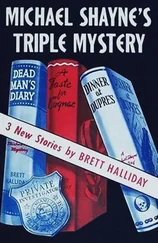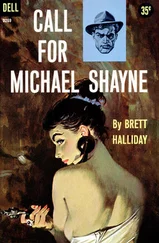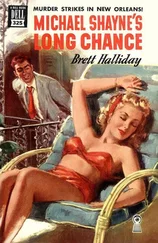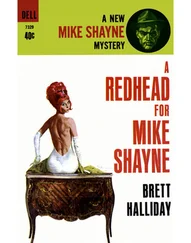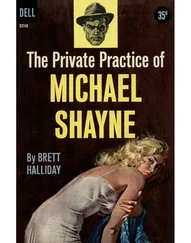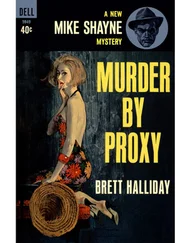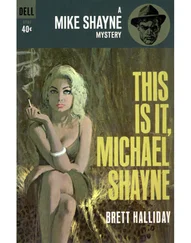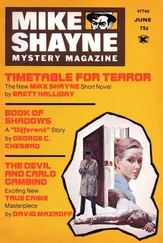Brett Halliday - Mike Shayne's Torrid Twelve
Здесь есть возможность читать онлайн «Brett Halliday - Mike Shayne's Torrid Twelve» весь текст электронной книги совершенно бесплатно (целиком полную версию без сокращений). В некоторых случаях можно слушать аудио, скачать через торрент в формате fb2 и присутствует краткое содержание. Город: New York, Год выпуска: 1961, Издательство: Dell Publishing, Жанр: Детектив, на английском языке. Описание произведения, (предисловие) а так же отзывы посетителей доступны на портале библиотеки ЛибКат.
- Название:Mike Shayne's Torrid Twelve
- Автор:
- Издательство:Dell Publishing
- Жанр:
- Год:1961
- Город:New York
- ISBN:нет данных
- Рейтинг книги:3 / 5. Голосов: 1
-
Избранное:Добавить в избранное
- Отзывы:
-
Ваша оценка:
- 60
- 1
- 2
- 3
- 4
- 5
Mike Shayne's Torrid Twelve: краткое содержание, описание и аннотация
Предлагаем к чтению аннотацию, описание, краткое содержание или предисловие (зависит от того, что написал сам автор книги «Mike Shayne's Torrid Twelve»). Если вы не нашли необходимую информацию о книге — напишите в комментариях, мы постараемся отыскать её.
Mike Shayne's Torrid Twelve — читать онлайн бесплатно полную книгу (весь текст) целиком
Ниже представлен текст книги, разбитый по страницам. Система сохранения места последней прочитанной страницы, позволяет с удобством читать онлайн бесплатно книгу «Mike Shayne's Torrid Twelve», без необходимости каждый раз заново искать на чём Вы остановились. Поставьте закладку, и сможете в любой момент перейти на страницу, на которой закончили чтение.
Интервал:
Закладка:
These improvements had helped — but not enough.
His losses had been considerably slowed down. Investments that showed splendid results almost equaled those that failed. There was one year, indeed, when his accounts showed that he had broken practically even.
All the same, his resources were again depleted when he met Marion, and she, too, was welcomed into the firm — though not in those exact words. Her $18,000 contribution to a joint bank account with Richard C. Brown had been modest, but timely and, for a while, it seemed as though the tide had finally turned.
But it hadn’t turned enough — not quite. He met the gay, ornamental, chaotic Bernice, and there came a day — the day he learned she had recently inherited $20,000—when he asked her, too, if she would like to be his helpmate. This was how he became Robert D. Brown, sitting among the financial guides and investment paraphernalia spread out on the table of a quiet Philadelphia restaurant.
This was why he regretted that his success, thus far, had been so moderate. The tide had now, at last, definitely turned. But there were still precarious days, uncertain weeks, ahead.
This was why, while he concentrated on his chops and salad and coffee, he also pondered the mysteries of the alphabet. Would there ever be a Rudolf E. Brown? If so, what would the fellow’s wife be like? He couldn’t help wondering.
He finished lunch and, afterward, went on with his calculations, making the serious decisions of the day. When he had them, as he paid the bill and tipped the waitress, he remembered something.
“Bold Magician in the sixth at Bowie,” he told her. “That’s today’s best.”
“What?”
It was apparent she had forgotten their earlier talk. Brown merely repeated the name of the horse, smiling with professional reserve.
He had a lot to do that afternoon. Place his bets — collect on yesterday’s single winner — call on three or four drugstores with those tiresome cosmetics. This last he considered a waste of time, save for use as an alibi he hoped he would never need.
3
It was seven o’clock that evening when Brown arrived at the big, solid apartment building in Newark, where he and Bernice had established residence. He did not like it, though he felt no fear at sight of a police prowl-car, an ambulance and other official cars, drawn up before the entrance, with a knot of spectators gathered in solemn curiosity on the walk outside.
But he could not down a wave of uneasiness when he exchanged a nod with the elevator man, then received a sudden, startled glance of recognition, quickly veiled and averted. The attendants usually spoke after one of Brown’s trips — and his suitcase showed he was just returning from one. Now they ascended in silence to the fourth floor.
He saw why, when he stepped out. The door of his apartment was open. Beyond it, he saw men obviously in authority, men in uniforms, men in plain clothes, even one man in white. Something unscheduled had occurred, and that alone spelled danger. But this was more than unusual — it was grim. Fright followed his first consternation, then panic, then dread.
Rigidly controlling himself, he walked through the small foyer of the apartment and halted in the middle of the living room. A uniformed police lieutenant looked at his suitcase, then at him. The lieutenant’s stare was sympathetic, but, at the same time, it openly and carefully studied his face. “Mr. Brown?” he asked.
“Yes. What’s the matter?”
“Bad news, I’m afraid. It’s your wife.” The lieutenant paused, letting this register. Brown gave no reaction, except to put down his suitcase, then urgently and fearfully wait to hear more. “I’m Lieutenant Storber. Your wife is dead.”
Brown gave a stunned, disbelieving echo. “Bernice dead? She can’t be. What happened?”
The lieutenant made indirect reply with another question. “Did your wife have any reason to commit suicide, Mr. Brown?”
“Suicide?” Brown’s astonishment was a spontaneous, total denial of the idea. “That’s impossible. It’s silly. Why, she just bought another… No, it’s out of the question.”
“She just bought another what, Mr. Brown?” the lieutenant asked him gently.
Brown answered mechanically, but his features began to come apart. “Another cookbook. Would a person who did that ever think about…? It was a thick one, too.”
“We know. We found it in the kitchen.”
Brown’s knees seemed to become unfastened, and the lieutenant helped him as he sagged into the nearest chair.
“I tell you, there must be a mistake,” he insisted weakly. “You haven’t investigated thoroughly enough. You’ll have to look around some more. When did it happen? How?”
The lieutenant sighed, took out a notebook. An interne emerged from an adjoining room, one used as a lounge and library. Not seeing Brown, he spoke to two men in plain clothes who were giving the living room a cursory inspection.
“D.O.A.,” said the interne. “It looks to me like a stiff dose of cyanide in a cocktail, probably a sidecar. That’s up to the medical examiner’s office. But I’d say she drank it quick, and death was practically instantaneous. At a guess, it must have been six or seven hours ago. Around noon.”
The interne went out, and the lieutenant sighed, flipped open the notebook, found a pencil.
“That’s about it, Mr. Brown.” The perfunctory words were filled with commiseration. “We just got here, ourselves, following a telephone call from some woman, probably a friend or neighbor we haven’t yet located, and that’s what we found. Your wife in the next room, with one empty glass — hers! Out in the kitchen, where she must have mixed it, cyanide in the bottle of brandy. No sign of a visitor. Nothing disturbed, apparently. She left no note, which is a little unusual. But you’d be surprised how often they don’t.”
“I don’t believe it,” Brown protested hotly. “She didn’t kill herself. She couldn’t. Never!”
The lieutenant sighed again, and his voice was soothing. “I know how you feel. But that’s the way it hits everybody, when it’s close to them. Because, if you realize a person is depressed and despondent, then something is done about it, more likely than not, and it never gets as far as this. There are other times a person gets into a suicidal frame of mind and doesn’t tell anybody. When that happens, naturally nobody believes it, at first.”
“I’ll never believe it,” said Brown firmly. “You’ve got to look into this. This is something else. It’s got to be.”
“Oh, don’t worry, we’ll dig into it,” the lieutenant assured him heartily, but without much personal conviction. “We won’t drop this until we’re completely satisfied. Now, where have you been this afternoon, Mr. Brown?”
Brown’s surprise was genuine. “Who —me?”
“Yes, you. We’ll begin with you. Where were you around twelve or one o’clock, for instance?”
“Having lunch in a restaurant in Philadelphia,” said Brown readily. He supplied the name of the place. “I was there for almost two hours. The waitress ought to remember me — she asked for a tip on the races, and I gave her Bold Magician. After that, I made several business calls at drugstores. My order-book is in the car downstairs. It shows where I stopped.”
The lieutenant was nodding, making only the briefest of notes. In spite of his shock and grief, Brown realized that the schedule to which he had adhered so rigidly was indeed paying off, in a serious emergency. He had never anticipated an emergency quite so drastic and dreadful. But now that it was upon him, the plan was there, a safeguard against the exposure of his illegal marriages, against even the possibility of suspicion in this present trouble.
Читать дальшеИнтервал:
Закладка:
Похожие книги на «Mike Shayne's Torrid Twelve»
Представляем Вашему вниманию похожие книги на «Mike Shayne's Torrid Twelve» списком для выбора. Мы отобрали схожую по названию и смыслу литературу в надежде предоставить читателям больше вариантов отыскать новые, интересные, ещё непрочитанные произведения.
Обсуждение, отзывы о книге «Mike Shayne's Torrid Twelve» и просто собственные мнения читателей. Оставьте ваши комментарии, напишите, что Вы думаете о произведении, его смысле или главных героях. Укажите что конкретно понравилось, а что нет, и почему Вы так считаете.

